|
|
|
Sort Order |
|
|
|
Items / Page
|
|
|
|
|
|
|
| Srl | Item |
| 1 |
ID:
088103
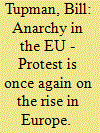

|
|
|
|
|
| Publication |
2009.
|
| Summary/Abstract |
Forty-one years later, and the spirit, if not the fervour, of May 1968 lives on. Then, over a month of student-led protests and a general strike crippled France and popular Marxist revolution appeared a real possibility in a Western European country.
This year, France experienced 283 protest rallies on Labour Day in cities from Marseilles to Bordeaux, Grenoble and Paris. Although not as dramatic as 1968, the estimate by one of France's largest trades unions of 1.2 million protesters was five times higher than the protests in May 2008.
In addition, compared to 1968, the 2009 Labour Day protests were more widespread throughout Europe. On 1 May in Germany, union leaders estimated 484,000 people demonstrated in 400 rallies across the country. In Berlin, 237 police were injured after running battles with stone-throwing activists, leading to 289 demonstrators being arrested and five cars torched. In Istanbul, more than 100 protesters were arrested and dozens of people injured as supermarkets and banks were deliberately targeted. In Athens, rioting was dispersed by tear gas, and in Linz in Austria, 20 people were injured and five arrested.
|
|
|
|
|
|
|
|
|
|
|
|
|
|
|
|
| 2 |
ID:
188818
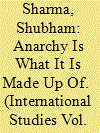

|
|
|
|
|
| Summary/Abstract |
In this article, I attempt to critically assess Kenneth Waltz’s deployment of the idea of anarchy to erect a ‘scientific theory of international politics’. First, I argue that the formation of a concept requires comprehension of the object from the standpoint of historical development, not a narrow reading of it. Second, I subject the thinner abstractions of self-help, balance of power and bandwagoning to the test of history. Third, I argue about mainstream international relations’ disdain for revolutions. I would posit that revolutions are fine templates which store rich agential history of structural transformation, a theme subject to much chagrin by realists of all hues, particularly neorealists. In doing so, I take the Bolshevik Revolution of 1917 as my benchmark. I elucidate that through the occlusion of first and second images, man and state, in the favour of third image, that is, structural anarchy, Waltz tends to ignore the role of agency as a conscious collective which could be best captured by the Bolshevik Revolution. In doing so, I rely on Perry Anderson’s three modes of agency in history. As a corrective to Waltz’s theorization, I make a strong case for class transcending both man and state as an organic category with immense potential of becoming a level of analysis which both acts upon the structure and refracts through it. I finally conclude by saying that anarchy was a condition and not a ‘social relation’ of any sort which could claim to constitute the ‘international’.
|
|
|
|
|
|
|
|
|
|
|
|
|
|
|
|
| 3 |
ID:
087859
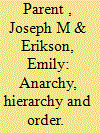

|
|
|
|
|
| Publication |
2009.
|
| Summary/Abstract |
How does order emerge from anarchy? While scholars generally agree that international politics is anarchic, there is much dispute about how anarchy orders relationships. This paper challenges prevailing views by attacking the problem of anarchy from behind. We examine how hierarchy creates order and argue that two mechanisms are responsible. The first is the direct actions of a leviathan; the second is an indirect effect, which counterintuitively results from insurmountable handicaps to central authority, that we call the threat of incompetent intervention. We then examine how these two mechanisms affect order as power decentralizes and highlight how bottom-up and top-down processes intersect. Our arguments are tested in difficult cases: highly developed states, where central authority is strongest, and international politics, where central authority is weakest. The arguments have broad implications for all the paradigms, trust in world politics and organizational change.
|
|
|
|
|
|
|
|
|
|
|
|
|
|
|
|
| 4 |
ID:
162058
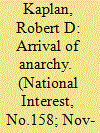

|
|
|
| 5 |
ID:
140814
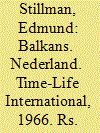

|
|
|
|
|
| Publication |
Nederland, Time-Life international, 1966.
|
| Description |
159p.: ill.hbk
|
|
|
|
|
|
|
|
|
|
|
|
Copies: C:1/I:0,R:0,Q:0
Circulation
| Accession# | Call# | Current Location | Status | Policy | Location |
| 000432 | 949.6/STI 000432 | Main | On Shelf | General | |
|
|
|
|
| 6 |
ID:
133547
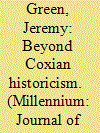

|
|
|
|
|
| Publication |
2014.
|
| Summary/Abstract |
This article scrutinises Robert Cox's theorisation of 19th century world order, proposing 'uneven and combined development' as an alternative conceptual approach. I contend that Cox's understanding of 19th century world order is insufficient as it neglects the significance of German ascendance. Privileging hegemonic construction of world order, Cox's account of the decomposition of Pax Britannica reifies the neo-realist anarchy problematique. Overall, Cox exaggerates the degree of rupture between phases of world order, obscuring developmental continuities that produce different 'geopolitical' contexts. Uneven and combined development, I propose, enables a fruitful reappraisal of the period. Process-based international historical sociology is suggested as an alternative way to think about 19th century world order and critical IR.
|
|
|
|
|
|
|
|
|
|
|
|
|
|
|
|
| 7 |
ID:
151221
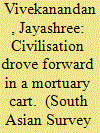

|
|
|
|
|
| Summary/Abstract |
Violence presents us with an interesting motif to study colonial politics, aptly captured in James Milne’s telling metaphor. Its inextricable association with colonialism implied a gradual conflation of political order with civilisation that is discernible in extant writings. The conventional paradigm in International Relations (IR) regards order as coterminous with the domestic domain and anarchy to be the structural attribute of international politics. This dichotomous divide permits little space for the hybrid states of existence of both anarchy and order that were often witnessed in the colonies and written about. The article examines the manner in which colonialism applied the notion of violence to the Indian context that was in denial of such complexities. It further argues that bringing imperial relations within the ambit of IR would help explain the differentiated interpretations of sovereignty that marked the parallel existence of the sovereign state system and the imperial political system.
|
|
|
|
|
|
|
|
|
|
|
|
|
|
|
|
| 8 |
ID:
152485
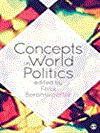

|
|
|
|
|
| Publication |
London, Sage, 2016.
|
| Description |
xii, 326p.pbk
|
| Standard Number |
9781446294277
|
|
|
|
|
|
|
|
|
|
|
|
Copies: C:1/I:0,R:0,Q:0
Circulation
| Accession# | Call# | Current Location | Status | Policy | Location |
| 059019 | 327.1/BER 059019 | Main | On Shelf | General | |
|
|
|
|
| 9 |
ID:
188386
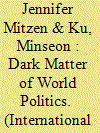

|
|
|
|
|
| Summary/Abstract |
International relations theory has had a trust revival, with scholars focusing on how trust can enhance interpersonal cooperation attempts between leaders. We propose there is another type of trust at play in world politics. International system trust is a feeling of confidence in the international social order, which is indexed especially by trust in its central unit, state persons. System trust anchors ontological security, and its presence is an unstated assumption of the international relations trust scholarship. In this paper we conceptualize system trust. We illuminate its presence by flagging the production of state personhood in a familiar case in international relations trust scholarship, the 1985 Geneva Summit between Reagan and Gorbachev. Interpersonal and system trust perspectives highlight different aspects of the same summit. The juxtaposition suggests new lines of research into the production of state persons in diplomacy, the relationship between interpersonal and system trust, and the impact of the rise of personalistic/patrimonial leadership on diplomacy and international order.
|
|
|
|
|
|
|
|
|
|
|
|
|
|
|
|
| 10 |
ID:
058102
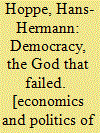

|
|
|
|
|
| Publication |
New Brunswick, Transaction, 2004.
|
| Description |
xxiv, 304p.
|
| Standard Number |
0765808684
|
|
|
|
|
|
|
|
|
|
|
|
Copies: C:1/I:0,R:0,Q:0
Circulation
| Accession# | Call# | Current Location | Status | Policy | Location |
| 048993 | 321.8/HOP 048993 | Main | On Shelf | General | |
|
|
|
|
| 11 |
ID:
046730
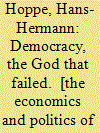

|
|
|
|
|
| Publication |
New Brunswick, Transaction Publishers, 2002.
|
| Description |
xxiv, 304p.
|
| Standard Number |
0765808684
|
|
|
|
|
|
|
|
|
|
|
|
Copies: C:1/I:0,R:0,Q:0
Circulation
| Accession# | Call# | Current Location | Status | Policy | Location |
| 045621 | 321.8/HOP 045621 | Main | On Shelf | General | |
|
|
|
|
| 12 |
ID:
110831
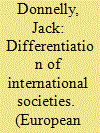

|
|
|
|
|
| Publication |
2012.
|
| Summary/Abstract |
Taking off from a recent article in this journal by Barry Buzan and Mathias Albert, I present a framework of structural differentiation as an alternative to IR's standard tripartite conception of the elements of structure. Rather than employ ideal type models, though, as Buzan and Albert do, I present a more open-textured, multidimensional account of differentiation. I also emphasize the systemic nature of structural analysis. The elements of structure are interdependent parts of wholes (systems) - not the independent variables implied by standard formulations such as 'the effects of anarchy'. A multidimensional systemic approach directs our attention to the diversity of and change in international systems and their structures, which mainstream structural IR typically ignores or obscures. I illustrate both the regularity of extensive structural change and the analytical utility of my differentiation framework with case studies of post-World War II international society and contemporary processes of globalization.
|
|
|
|
|
|
|
|
|
|
|
|
|
|
|
|
| 13 |
ID:
097022
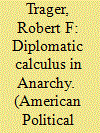

|
|
|
|
|
| Publication |
2010.
|
| Summary/Abstract |
When states come to believe that other states are hostile to their interests, they often reorient their foreign policies by realigning alliance commitments, building arms, striking first, mobilizing troops, or adopting policies to drain the resources of states that menace them. This article presents a crisis bargaining model that allows threatened states a wider array of responses than the choice to back down or not. Two implications are that (1) "cheap talk" diplomatic statements by adversaries can affect perceptions of intentions, and (2) war can occur because resolved states decline to communicate their intentions, even though they could, and even though doing so would avoid a war. The model relates the content and quality of diplomatic signals to the context of prior beliefs about intentions and strategic options. In simulations, this form of diplomatic communication reduces the likelihood of conflict.
|
|
|
|
|
|
|
|
|
|
|
|
|
|
|
|
| 14 |
ID:
150481
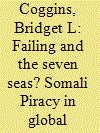

|
|
|
|
|
| Summary/Abstract |
This article reconciles the conflicting evidence on the relationship between governance and maritime piracy at the macro (state) and micro (sub-state) level using original data (2000–2011) and a study of piracy’s emergence in and around the Horn of Africa. It finds a consistent, positive relationship between state weakness and increased piracy production cross-nationally. However, Somali piracy belies the “anarchy as opportunity” mechanism implied by the large-N study. The pirate industry there received substantial support from local authorities, more consistent with a quadratic, “stability-enabled” argument regarding governance. I conclude that each is half-right. At the macro level, anarchy presents permissive conditions for simple banditry, but limits the potential for robust organized crime unless corruptible sub-state authorities exist and can be co-opted. Policy-wise, efficient pirate deterrence programs should concentrate on regions within failed states with this mix of characteristics. Methodologically, the results point to the limitations of existing metrics of state fragility and governance, and recommend that more nuanced measures be used.
|
|
|
|
|
|
|
|
|
|
|
|
|
|
|
|
| 15 |
ID:
167190
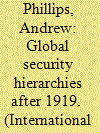

|
|
|
|
|
| Summary/Abstract |
Since 1919, world leaders have sought to uphold and advance international order by sponsoring a succession of global security hierarchies, understood as authoritative arrangements that are global in scope and dedicated to mitigating international security challenges. These hierarchies have progressively broadened in the inclusivity of their security referents. Explicitly racist and civilizational answers to the question ‘security for whom’ have given way to more cosmopolitan visions of security hierarchy. The scope of the challenges these hierarchies have aimed to mitigate (‘security from what’) has also broadened, alongside the intrusiveness of the measures (‘security through which means’) licenced to manage them. The progression towards more inclusive, ambitious and intrusive global security hierarchies has nevertheless evolved in tension with the parallel globalization of both nationalism and the sovereign state system. These countervailing influences – in conjunction with the recent worldwide resurgence of illiberal forces – now threaten the prospective longevity of today’s United Nation (UN)-centric cosmopolitan global security hierarchy.
|
|
|
|
|
|
|
|
|
|
|
|
|
|
|
|
| 16 |
ID:
106657
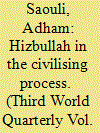

|
|
|
|
|
| Publication |
2011.
|
| Summary/Abstract |
This study builds on Norbert Elias's 'civilising process' theory to examine when, how and why Lebanon's Hizbullah exercises self-restraint or violence in its political interactions. As opposed to studies that focus on how Hizbullah's ideological goals determine its political behaviour, this study argues that Hizbullah's political conduct should be understood by locating the Islamic party at the crossroads of war-making with Israel and state-making in Lebanon. Hizbullah's aim to minimise its vulnerability to Israel led it to rationalise its behaviour in Lebanon by exercising self-restraint and by remoulding its ideology. However, as the political divide in Lebanon has sharpened and the state there weakened, Hizbullah has advanced to fill the void by employing state-like measures, including violence.
|
|
|
|
|
|
|
|
|
|
|
|
|
|
|
|
| 17 |
ID:
092041
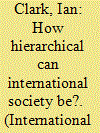

|
|
|
|
|
| Publication |
2009.
|
| Summary/Abstract |
Waltzian analysis proceeds from the distinction between the ordering principles of anarchy and hierarchy. This raises the large question whether the introduction of pockets of 'authority' would represent a fundamental challenge to an anarchical international society. The article investigates this theme by exploring a putative institution of hegemony. It begins with a distinction between primacy and hegemony, and develops the idea of hegemony as a potentially legitimate practice of international society. Since most political systems are 'mixed', it then concludes that adoption of a hierarchical principle of hegemony is no more contradictory for international society than is its development of other such institutions. In common with much recent scholarship, it agrees that international society can function as a form of 'hierarchy under anarchy', within which hegemony could play its part. The article finally demonstrates what is distinctive to hegemonic behaviour, and suggests that practices such as soft balancing do not represent any form of balancing at all, but are better understood as attempts to institutionalise hegemony.
|
|
|
|
|
|
|
|
|
|
|
|
|
|
|
|
| 18 |
ID:
144839
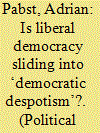

|
|
|
|
|
| Summary/Abstract |
Post-democracy and cognate concepts suggest that the postwar period of democratisation has given way to a concentration of power in the hands of small groups that are unrepresentative and unaccountable, as exemplified by the rise of multinational corporations and their influence on democratic politics. This article goes further to argue that this does not fully capture the triple threat facing liberal democracy: first, the rise of a new oligarchy that strengthens executive power at the expense of parliament and people; second, the resurgence of populism and demagogy linked to a backlash against technocratic rule and procedural politics; third, the emergence of anarchy associated with the atomisation of society and a weakening of social ties and civic bonds. In consequence, liberal democracy risks sliding into a form of ‘democratic despotism’ that maintains the illusion of free choice while instilling a sense of ‘voluntary servitude’ as conceptualised by Tocqueville.
|
|
|
|
|
|
|
|
|
|
|
|
|
|
|
|
| 19 |
ID:
092035
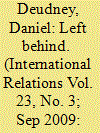

|
|
|
|
|
| Publication |
2009.
|
| Summary/Abstract |
Anarchy and the balance of power are the two core ideas in Waltz's neorealism, and he explicitly draws them from early modern political theory, particularly Hobbes and Rousseau. Unfortunately, Waltz leaves behind a key variable in these early modern state-of-nature arguments: violence interdependence - the capacity of actors to harm one another (independent of distribution of power). This difference between the extreme insecurity of the state of nature and the tractable insecurity of the state of war derives from different degrees of violence interdependence. The variable is implicit but powerful in Hobbes, and explicit in Rousseau's analysis of topographic fragmentation as a foundation for the European state system. As the effects of the industrial revolution made themselves felt, many theorists (the global geopoliticans, Carr and many liberals) continued to employ the variable Waltz dropped, and they generally argued that Europe had shifted from a state-of-war to a state-of-nature anarchy, thus posing the choice of catastrophe or integration. Herz and Morgenthau continue this argument in the nuclear era, reaching very different conclusions than Waltz. Similarly, the balance of power was conceived by early modern republican theorists as the counter to hierarchy, and this was transposed to the 'system level' via the device of referring to Europe as a whole as a 'republic' that was in part 'by nature'. Other important republican power restraints (notably division, mixture and union) were dropped by Waltz but are developed by liberal globalist security theory.
|
|
|
|
|
|
|
|
|
|
|
|
|
|
|
|
| 20 |
ID:
106664
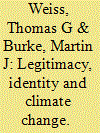

|
|
|
|
|
| Publication |
2011.
|
| Summary/Abstract |
Resource scarcity and climate change could provoke major inter-state and intra-state violence and humanitarian emergencies, an especial threat to the global South. This article examines the dynamics that have followed the major violent crises of the past few centuries to determine whether climate-change-induced conflict might paradoxically generate norms of non-violence and collective identification, and in turn lead to a more co-operative culture of anarchy. Especially since 1945 we have witnessed the development of a 'security community' in the North Atlantic-that is, a group of states that not only resolve conflict without resort to violence but also consider war among their members unthinkable. Such communities might develop in other regions in two stages. First, state internalisation of liberal norms of democracy and human rights may enhance the role of intergovernmental organisations in mitigating climate-change-induced conflict. Second, collective identification among states and individuals may be stimulated by structural similarity between increasingly democratic states, the perception of a common fate arising from shared threats, and an expanding global civil society and epistemic communities preoccupied with climate change. Climate change could thus spur movement towards more legitimate and authoritative intergovernmental organisations within a world society that would be more effective at solving common problems than those operating within today's more fragmented international society.
|
|
|
|
|
|
|
|
|
|
|
|
|
|
|
|
|
|
|
|
|